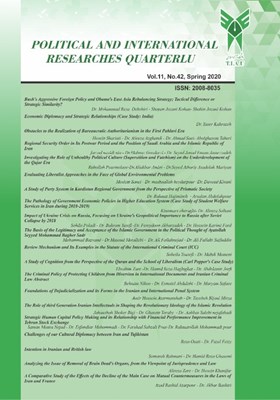A Study of Party System in Kurdistan Regional Government from the Perspective of Prismatic Society
Subject Areas : Political and International Researches QuarterlyRahmat Hajimineh 1 * , Arsalan Abdolahpour 2
1 -
2 -
Keywords: Kurdistan region, Party System, Prismatic Society, Good-Governance, Pattern-centered Interaction,
Abstract :
Rahmat Hajimineh [1] Arsalan Abdolahpour [2] Abstract: In 1991,the Iraqi Kurdistan Region declared autonomy within the Iraqi legal framework following the plan for safe and no-fly zone. The region has officially become a federal region with a local government with a semi-independent Iraqi administration, following the approval of the Federalism Act in Iraq in 2005. This study examines the theory of Fred Riggs' prismatic community and the characteristics of this type of society to examine the historical features of the bureaucracy in the Kurdistan region. The main question of the research is whether the Regional Government has been able to remove such indicators as heterogeneity, formality, interference, kinship and ethnicism, market and concentration of power, as components of prismatic community, or does it continue to pursue its governance based on traditional structures? The method of data collection, due to the overseas nature of the subject of study and lack of access to the documents of that system, is in the form of library and Internet, and the research method is descriptive-analytical. According to Riggs' model, the results suggest that the conditions and characteristics of the region's political system, despite having democratic components, are more in line with the status of the prismatic society. [1]- Assistant Professor of International Relations, Department of Communication and Social Sciences, East Tehran Branch, Islamic Azad University, Tehran, Iran: Corresponding Author [2] - PhD Student of Public Policy, Tabriz Branch, Islamic Azad University, Tabriz, Iran
_||_

